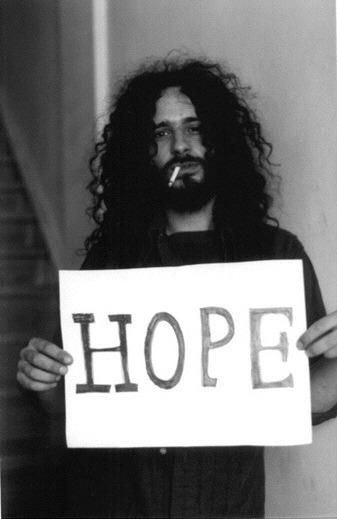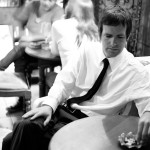Efrim Menuck will be heard. As the guitarist and vocalist of his group, Thee Silver Mt. Zion Memorial Orchestra & Tra-La-La Band (originally formed in 1999 as a side project to the legendary Godspeed You! Black Emperor), Menuck will release his fifth LP, 13 Blues for Thirteen Moons, which contains four lengthy, sweeping songs that showcase the Canadian troupe at its most jarring and abrasive. In the face of desperate times, 13 Blues is a sprawling, in-your-face rock record bubbling with vital commentary that refuses to be ignored. Even the seemingly inoffensive twelve seconds-long tracks of noise that begin the album are somewhat of a clever “fuck you†to iPod-toting casual listeners, according to Menuck.
Here the musician speaks with self-titled about 13 Blues‘ social, personal and political themes, losing his record collection and why he thinks the members of Radiohead are just a bunch of “con men.â€
self-titled: Your music has always been a tool for communication. What are you trying to communicate with this record?
Ho, ho. Big question. I don’t know. This record, more than our last record, is about the difficulty of getting by in this life and people going through rougher times as we all get a little bit older.
Is it a message that’s becoming more vital now to everyone, or is it developing from you personally?
Yeah, a lot of it’s personal, but I think it can be generalized, too.
You’ve said that the album’s opening song, “One Million Died to Make This Sound,†deals with the concept of ownership and how it relates to music. What do you mean by that?
It’s a cliché, I guess. Music doesn’t exist on its own. Anything that we call new music or whatever’s popular this week or this month or this year is obviously the product of a bunch of lesser-known musicians falling away who weren’t paid attention to. It’s a rich and a long history. And I think that people–I feel like a fogey saying this and people have been saying this forever, but I think it really is true now–that people are less and less in touch with that idea of what music is, that it’s an ancient, ancient, ancient, long, long, long, long road that’s been going on forever. So the song is kind of about that, the idea that music doesn’t belong to anybody. It’s just a long continuing stream. And who get rewarded today are generally the people who’ve been lucky enough to arrive at the right place at the right time to reap the benefits that other people never got the chance to reap.
How much of that is stemming from the iPod era that we’re in, where there’s so much debate over actually physical ownership of music, whether it be pirating music or buying songs legitimately from iTunes?
That’s part of it. The economics of music have become really confusing right now. That’s a long whole other discussion, you know? It’s not just the way music is disseminated right now. It’s the way music’s written about. The Internet has lent itself to short-form pieces. Web pages always need new content, and that’s strengthened the shitty tendencies when it came to music journalism, which is highlighting only what’s new and what’s now and what’s immediate. When we wrote that song, it was kind of the elephant in the room. And in the last few months, I think people are starting to get more frustrated with that state of affairs. But we wrote that song three years ago.
There’s so much noise on the Web, and it becomes hard to process, yeah.
I don’t think people do process it. Or else, what they do process is the part of your brain that gets tickled when you’re changing channels quickly on cable TV. It’s a certain type of pattern recognition and symbol recognition that’s interesting but, you know, doesn’t lend itself to complicated theses or anything like that. People’s brains turn into news aggregators at some point, which on its own isn’t a problem, but if that’s all there is, it’s a frustrating time for anyone, I think, that’s into ideas that can’t be summed up in two or three sentences.
Are there any benefits from the state of noise on the Web, though? Growing up in the Midwest, I discovered a ton of new music that I still love today through junky, over-posted music blogs and MySpace.
I mean, I hear you. I know for myself, when I was growing up, the thing you would do is go see a band on a Wednesday night who you’d maybe heard a couple of good things about. That’s how you’d check things out. Some of the best nights I had in my life were bands that I hated. But it was a totally different understanding of music on that level. Music was mysterious. All you had was the record in front of you half the time. To read an interview with a band was a rare thing, if it hadn’t gotten written about in Rolling Stone or even Spin magazine or Alternative Press or whatever.
When you write a song, is it as much yours as it is your audience’s?
I mean, it’s ours [laughs]. Yeah, it’s ours. Yeah. Yeah.
But didn’t you say that music doesn’t necessarily belong to anyone?
Yeah, I mean, music doesn’t belong to anyone when it comes from how people profit from it. In that sense, music belongs to everybody because it’s a human thing.
On the new record, you chant “No heroes on the radio.†Does a statement like that come out of anger or frustration?
Both. That statement implies to a lot of radio but specifically to Canadian public radio because I’m Canadian, and right now in my kitchen, the CBC is on. What’s happened to that radio station in the last couple of years is just disgusting, but you know, across the board, there are no heroes on my radio, ever.
So you’re not necessarily talking about musicians?
Oh, I’m talking about musicians, too. Yeah, yeah, yeah, absolutely. There’s a lot in that little line.
Was there ever a time when you remember your heroes being broadcast?
Um, yeeeah. No. Again, when I was growing up, it was a time when there was no good music at all on the radio. There wasn’t even contemporary rock music on the radio. Guns N’ Roses, when that happened, that was a huge deal because there was an honest-to-god guitar solo with distortion on it on a song that was popular. So yeah, radio’s always been this wasteland.
How did you discover new music?
Mostly through friends taping me records. We’d all swap cassettes all over the place. College radio in Canada is a bit different than college radio in the states because it never really turned into an industry. It’s smaller. So college radio in Canada for sure. And then, weird little fan-zines, you know? You’d see a poster on a pole and go, “Hey, I like that band name.†It was all pretty simple.
How do you discover new stuff today?
I don’t discover a lot of new stuff today. I really don’t. But a lot of that is, between playing in this band and the fact that I work in a recording studio, so many hours of my day are occupied with music, music that’s being made now. In my free moments, I spend more time reading and listening to old records than I do looking for new stuff.
What kind of old records?
Oh, all sorts of stuff. I hate that fucking question [laughs]. Lately I’ve been listening to Exuma. I’ve been listening to it over and over again. It’s some of the best music I’ve ever heard. It’s one of those miracle things where you figure at some point, old records that you’ve never heard of completely destroy you. Stuff keeps popping out of the woodwork.
You once declared that musicians are cowards.
Yeah.
Do you still believe that?
Absolutely. It’s just a fact, something I’ve seen. Every single musician that I know is a coward.
More so than anyone else?
I know musicians more than I know dentists or doctors. Politicians are cowards for sure. I think unlike politicians, musicians…no, I won’t even say that. That’s too grandiose. But I will say that musicians are cowards. There are a bunch of musicians I love that are clearly cowards that have done things that are miraculous given how cowardly they are.
This is your first album to contain a book of lyrics. Any reasoning behind that?
There’s two guys that run Constellation Records and one of the guys, Don [Wilkie], has really had a hardcore aversion to lyrics sheets. So this is the first time that I’ve ever gone toe to toe with him and said, “No, we need the lyrics.†For a long time now, I’ve wanted lyrics sheets mostly because there are a lot of people who buy our records who don’t speak English as a first language. Also, I think anyone who writes words has to cringe when they read references lyrics they’ve written and it’s completely wrong.
I wanted to ask you about the actually physical packaging to your record because it’s pretty beautiful in its construction with elegant illustrations and type, all that. I get a lot of CDs in the mail to listen to every day. They typically go straight into a stack, and I listen over the weekend. But your album caught my eye before I even know what it was. How important is packaging to the music you make?
It’s important to me. Again, it’s an old-timey approach because I love LPs. We conceive these things we make as LPs and conceive the artwork how it’s gonna look on a 12-inch record jacket. Yeah, again, that control over the context is one of the lovely things about recorded music, and it’s unique to recorded music, that fact that a record is, by necessity, like a mixed-media art piece. It has packaging.
Moving more into the digital realm, album packaging seems to become less and less important as albums are increasingly thirteen MP3s rather than a product to hold in your hand. What do you think will be lost if that aspect of music goes away?
I don’t think that state of affairs is going to last that long. Humans are drawn toward physical objects, for better or for worse, in bad ways and in good ways. So I think we’re in a totally heinous transitional period. But I think what we end up with, whether it’s next year or five years from now, is gonna be, somehow, a return to objects that people can hold in their hands.
You mean like a digital form though, right?
Well, obviously it’s gonna be digital. I’m not a fan of the CD. I think people are just as happy listening to an MP3 as they are to a CD, so obviously the medium that holds the actual audio information is going to change. What that storage device is nestled within, I think, is going to return to some sort of object.
So do you think our desire to have a physical object that we can hold and touch and open up is greater than our need for convenience?
I do. Yeah. Well, again, what’s weird about the MP3 age we’re living in and the fact that people can download any record they want at any given moment, legally or illegally, is that people have hard drives of records that they’ll never listen to. I’ve always hated record collectors. I’ve never understood that collector compulsion. And it seems that same kind of vibe that you get with people and their hard drives full of songs.
Just because it’s a matter of how you can’t possible be completely into something or totally love something if you have so many things to choose from?
I think that’s absolutely true. Well, no, sorry. In my experience with the people that have the compulsion to collect, collect, collect, that’s what their kick is. It has less to do with the objects themselves and more to do with the accumulation of those objects. Like I said, I knew record collectors years ago that had that same mentality. They didn’t listen to the records they owned. You’d look at the records, and they’d be unplayed. So I think, when I’m talking about how people have this basic need for objects, there’s never that many people who are really into music, eh? I think it’s the same amount all the time. I think people who are into music right now are patiently waiting for this turn of events that kind of returns it to a place that’s a little more soul affirming.

I recently looked at my wall of CDs and realized there were a couple hundred discs on there that I don’t even know. It’s kind of ridiculous. So I decided to edit my CD life down.
My apartment got broken into last summer and got totally cleared out. After a long series of events I ended up being able to buy back most of the stuff that got stolen. The last thing that I was able to buy back was my CDs. And I almost didn’t buy the CDs back because I was actually kind of happy.
Finally free.
Yeah, yeah, yeah.
13 Blues begins with 12 seconds-long tracks of noise before the first song actually starts. Is there any significance of opening your new album on the thirteenth track?
Oh, we’ve always been into little things like that. People give us a hard time about it. It comes down to a record or a CD–it’s like a mixed-media art piece. If there’s some little ribbon you can attach to the thing that can improve the composition, the overall composition, in your eye, you go for it. So yeah, we thought it would be good to start on track thirteen. The other affect is that all those short little drones, if you have that sound-check function enabled in iTunes or on your iPod, and you’re in shuffle mode, your iPod totally glitches out.
Awesome!
That’s kind of a bonus feature.
And people who buy it in the LP format won’t even notice, will they?
Yeah, that’s it. It’s just a little grain of sand. Not a huge “fuck you.†It’s not even a “fuck you.†It’s just a little grain of sand.
Maybe I’m reading too much into this, but what’s the significance behind the number thirteen? You’ve used it in song titles before. It appears on this album, which starts on the thirteenth track. And the final two songs end after about thirteen minutes.
That song length thing was an accident. The thirteen thing for this record is really this idea of, I’m not very into astrology, I’m not into astrology at all, but in Chinese astrology, a year with thirteen new moons–and 2007 was a year with thirteen moons–people who are borderline depressive or just emotionally sensitive have a difficult time in the year of thirteen moons. I’m not a believer. But last year was the year of thirteen moons, and almost everyone–not almost everyone–a bunch of people, some of my dearest and closest friends had the worst years of their lives.
So it sounds like the album is very personal. Is that different what you’ve done in the past, considering you’re known for tackling social and political statements?
It’s always been personal. Because we perform the songs, you choose your words and you choose your presentation in ways that you’re talking about things that are personal to you, but you’re trying to universalize it. Not universalize it. But bring it up in a way that other people will relate to it.
Are there any sonic elements or methods in your songwriting that you haven’t explored previously?
Yeah, definitely. Because it’s been, what, now three years since our last record and in those intervening years we toured so much and then we swapped out drummers because our last drummer had a little freak-out and quit. So yeah, this is the first record we’ve ever recorded feeling like a lean, mean live band. It rocks more than the other records, sort of more unashamedly.
I’m curious to hear what you think of Radiohead’s pay-what-you-want method.
I think they’re really fucking clever, careerist con men. Yeah, they’re smart. Fuck yeah, they’re smart. It interests me about as much as something Bill Gates would do or what Oprah Winfrey would pick as her book of the month. It’s interesting in that category of “What do people do when they have an insane amount of money at their disposal and the means to make statements writ large.â€
Is it a method you could ever see yourself adopting?
I mean, yeah, Well, maybe. I dunno. It already is like people pay what they can, except it’s binary. They either pay or they don’t.
Do you think there’s any integrity on their part, though?
Yeah, I think there’s integrity. But the moment you’re in that realm, words like “integrity†mean a whole other thing. It’s different. That’s why I get so frustrated with, not bands as large as Radiohead, but bands that aren’t quite as large. The moment you become a popular band, the choices should become easier. I’m always surprised at how people generally get more conservative as they get more successful. So it’s like, integrity, I don’t know. It’s something else at that point.
I’ve got one more thing to say about that. When U2 had their big comeback record a few years ago and won the Grammy, I was watching the Grammys with a couple of friends. U2 won and Bono went on this speech, and all he kept talking about was, “It’s great to be the greatest rock ‘n’ roll band in the world again.†At a certain point, when your rent is covered forever, beyond covered, when money is not a concern, I think what concerns bands at that point is stuff like that. It’s weird. It’s a whole other thing. Radiohead aren’t as heinous as that. But it gets kind of boring.
You’ve been a longtime critic of the record industry, both the major labels and the indie labels. Does it give you any satisfaction that it’s fallen under such hard times?
No. It really doesn’t. It really doesn’t because who’s profiting is Apple computers and every single high-speed Internet provider in every wealthy country of the world. The new boss is the same as the old boss, except musicians are earning less money.
And that’s a shame.
Yeah, well, as a musician who’s barely clinging on month by month and always has been, for this class of musicians, yeah, it is a shame.
I was a bit surprised when I heard one of your songs on the commercial for the new season of Lost. How did that come about?
We got contacted by them that they were gonna run an ad for two weeks, and they offered us a crazy amount of money. Our first question was, “What song?†In hindsight, there were maybe four songs they could have picked where we would have said yes. They were songs that didn’t have words or were diaphanous enough, you know what I mean? And they picked one of those songs. And there are some people in the band who like that show.
Are you a fan?
I do like that show, yeah. It was that simple.




